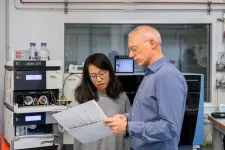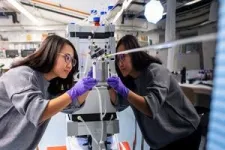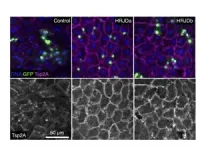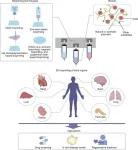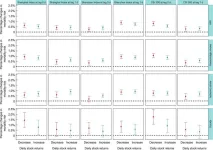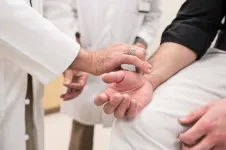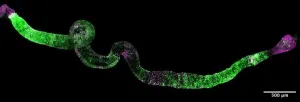(Press-News.org) Fewer side effects, improved chances of healing: the goal of precision medicine is to provide patients with the most individualized treatment possible. This requires a precise understanding of what is happening at the cellular level. For the first time, researchers at the Technical University of Munich (TUM) have now succeeded in mapping the interactions of 144 active substances with around 8,000 proteins. The results could help to identify previously unknown potential benefits of existing drugs.
Practically all drugs either affect, produce or eliminate proteins – or are, in fact, proteins. But what exactly happens when a high or low dose is taken? And what is going on at various points in time while the drug is working? Does the drug cause the cell to produce new proteins or block the production of others? Answers to these questions have been lacking. But now, using a method known as decryptE, the team has succeeded in revealing these interactions.
Large numbers of results in a short time
To do this, the researchers treated cells with various doses of 144 active substances over an 18-hour period. Most of the drugs are already being used in cancer treatment or are in the clinical approval stage. After being extracted, the proteins were analyzed with mass spectrometry. The team then used the data to study the cell reactions. This yielded more than one million dose-response curves showing the mechanisms behind the effects of the active substances over the course of treatment.
The results have now been published in the journal Nature Biotechnology by Bernhard Küster, professor of proteomics and bioanalytics at the TUM School of Life Sciences, Nicola Berner, Stephan Eckert and a team of researchers coordinated at the TUM Chair of Proteomics and Bioanalytics. The data is available to the global research community in the ProteomicsDB database and the associated app.
Recognizing the potential of existing drugs
Cancer is a prime example of why a detailed understanding of these processes is so important: Depending on the type of cancer, very different things are happening at the molecular level. This is decisive for selecting suitable treatments and may offer clues for the development of new drugs. With the data the team was able to show, for example, that the immune system can be weakened by a class of drugs known as HDAC inhibitors. This can in turn affect the treatment of tumors that leverage the immune system.
The fact that the team were able to make this finding without having looked for it can be attributed to the way decryptE works. Experiments are generally designed to study a well-defined question and, ideally, to produce an answer. By contrast, decryptE records everything that happens – and generates huge amounts of data that researchers can now analyze with digital methods and in terms of various questions. The team is hoping that the results will also harbor insights into previously undiscovered effects of widely used drugs.
“Many drugs can do more than we think,” says Bernhard Küster. “A familiar example is Aspirin. Its effectiveness as a painkiller was well established. But observations showed that the effective ingredient, acetylsalicylic acid (ASA), also has a blood thinning effect. Nowadays it is routinely given to patients who suffer a stroke or heart attack. We believe that many widely used drugs will also have effects of which we are still unaware. One of the goals of our research is to systematically seek them out without having to wait for such accidental discoveries.”
Publication:
Eckert, S., Berner, N., Kramer, K. et al. “Decrypting the molecular basis of cellular drug phenotypes by dose-resolved expression proteomics” Nat Biotechnol (2024). DOI: doi.org/10.1038/s41587-024-02218-y
Further information:
• Database ProteomicsDB: https://www.proteomicsdb.org/decryptE
• App: https://decrypte.proteomics.ls.tum.de/main_decrypte_explorer/
• Prof. Bernhard Küster is a core member of TUM’s Munich Data Science Institute (MDSI)
• Chair of Proteomics and Bioanalytics
Additional material for media outlets:
Photos for download: https://mediatum.ub.tum.de/1750472
END
Proteins as the key to precision medicine: Finding unknown effects of existing drugs
2024-08-01
ELSE PRESS RELEASES FROM THIS DATE:
Cheese of the future: Consumers open to animal-free alternatives
2024-08-01
Companies and institutes are currently working on biotechnological processes for the production of dairy products without the use of cows: In so-called precision fermentation, egg and milk proteins are produced with the help of bacteria, yeasts or other fungi. This results in foods such as milk or cheese with a familiar flavour and texture. Supporters hope that this will lead to more sustainable food production, as nutrient-rich proteins can be produced using fewer resources. But will consumers accept such products? Researchers at the University of Göttingen have found that a large proportion of German consumers are willing to try and buy cheese produced in this way. ...
New Moffitt study explores how antifragility could revolutionize cancer treatment
2024-08-01
TAMPA, Fla. — Researchers constantly seek innovative approaches to tackle cancer. One concept gaining traction is antifragility, a property where systems not only withstand stress but improve because of it. In cancer research, this concept is particularly relevant for tumors that adapt and evolve in response to treatment. Understanding antifragility could lead to more effective therapies. In a new study published in npj Complexity, Moffitt Cancer Center researchers offer a new perspective on antifragility, proposing ...
Advances in 3D organ bioprinting: A step towards personalized medicine and solving organ shortages
2024-08-01
In a latest review published in Engineering, an international team of scientists from China and the United States has presented a comprehensive analysis of the latest advancements in 3D organ bioprinting. This innovative technology holds the potential to revolutionize regenerative medicine and tackle some of the most pressing issues in organ transplantation.
Organ damage or failure, whether resulting from injury, disease, or aging, poses a significant challenge due to the body’s limited natural regenerative capabilities. Traditional organ transplantation, while lifesaving, is fraught with difficulties including donor shortages and the risk of immune rejection. This has spurred a ...
China forges ahead with technological innovations in large-span arch bridge construction
2024-08-01
The field of bridge engineering is witnessing a transformative era, as China leads the way with its recent advancements in constructing large-span arch bridges. Jielian Zheng, the member of the Chinese Academy of Engineering from Guangxi University, has authored a research article in Engineering, titled “Recent Construction Technology Innovations and Practices for Large-Span Arch Bridges in China.” The article elucidates the significant strides made in the construction of concrete-filled steel tubular (CFST) and steel-reinforced concrete (SRC) ...
External mentorship key in encouraging trainees to pursue classical hematology
2024-08-01
(WASHINGTON, August 1, 2024) — In a year-long pilot program, external mentorship increased confidence, furthered career development, and facilitated networking opportunities for trainees in classical hematology, according to a study published in Blood Advances.
Classical hematology, the study of non-cancerous blood disorders such as sickle cell anemia and thrombotic and hemorrhagic disorders, is projected to face a significant workforce shortage in the coming years. The American Society of Hematology’s (ASH) previous surveys of hematology/oncology program ...
Tiny flyers with large impact: Blowflies carry bird flu virus
2024-08-01
Fukuoka, Japan – Researchers from Kyushu University have discovered that blowflies, a family of flies strongly attracted to decaying flesh and feces, are carrying the bird flu virus in southern Japan. Their findings, published in Scientific Reports, introduce a potential new route of transmission for bird flu and highlight the need to develop new countermeasures to prevent and control the disease in poultry farms.
Since 2020, bird flu has been spreading rapidly around the globe, leading to the death of millions of wild birds and the culling ...
Stock market turbulence linked to increased risk of heart attacks, strokes, and suicide: A groundbreaking study analyzes 12 million deaths
2024-08-01
In a recent study published in Engineering, a team of Chinese researchers has uncovered a startling correlation between stock market volatility and the risk of major adverse cardiovascular events (MACEs) and suicide. The research, which analyzed over 12 million deaths across China from 2013 to 2019, provides compelling evidence that the psychological stress induced by stock market fluctuations has severe and immediate health implications.
The study, titled “Stock Volatility Increases the Mortality Risk of Major Adverse Cardiovascular Events and Suicide: A Case-Crossover Study of 12 Million Deaths,” is a wake-up call for investors, ...
Judging your own happiness could backfire
2024-08-01
Judging how happy you are could backfire and negatively impact life satisfaction and psychological well-being, according to research published by the American Psychological Association.
In three experiments comprising more than 1,800 participants, researchers found that having concerns or judgments about one’s own level of happiness were associated with lower well-being, due in part to greater negativity and disappointment about positive events.
The research was published in the journal Emotion.
Thinking too much about one’s own level of happiness could be related to fears about not measuring up or not being as happy as other people, said lead researcher Felicia ...
Uncontrolled hypertension: The old ‘silent killer’ is alive and well
2024-08-01
In the United States and worldwide, cardiovascular disease is the leading avoidable cause of premature death and disability. Primarily heart attacks and stroke, cardiovascular disease accounts for more than 900,000 annual deaths nationally and about 10 million deaths globally.
Uncontrolled hypertension or high blood pressure is a major risk factor for stroke and heart attacks. Prevention and management of cardiovascular disease involves therapeutic lifestyle changes such as diet and exercise and adjunctive drug therapies of proven benefit.
In a commentary published in The American ...
Talking about regeneration
2024-08-01
Researchers including those from the University of Tokyo’s Graduate School of Pharmaceutical Sciences transferred genes from simple organisms capable of regenerating their bodies into common fruit flies, more complex animals that cannot. They found the transferred gene suppressed an age-related intestinal issue in the flies. Their results suggest studying genes specific to animals with high regenerative capability may uncover new mechanisms for rejuvenating stem cell function and extending the healthy lifespan ...
